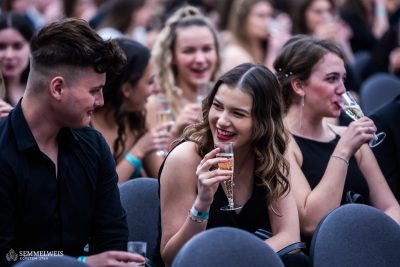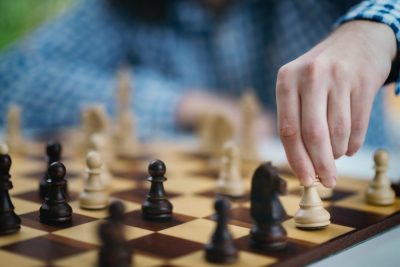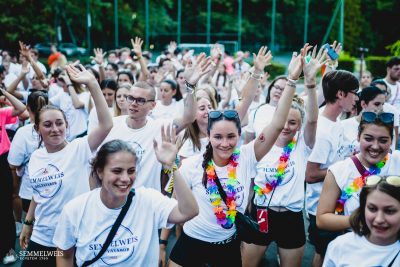Dr. Gabriella Beliczai-Marosi, a recent graduate from the Semmelweis University Faculty of Medicine, investigates the vasorelaxant effects of hydrogen peroxide from the point of view of gender differences on individuals suffering from Type 2 Diabetes. During her studies at Semmelweis, Gabriella was a member of the Kerpel Talent Support Program, she was a participant at multiple successful Students’ and International Students’ Scientific Association conferences, presented at international conferences, and co-authored two international scientific reports. Her outstanding research merited the honour of the Kuffler Scholarship, among others. She worked in two different institutions simultaneously, all the while pregnant with her son. Gabriella’s supervisor and mentor, Dr. Levente Kiss, an assistant professor at the Department of Physiology, emphasizes: “The Students’ Scientific Association program equips students with a way of thinking that they can utilize later in practice.”
Dr. Gabriella Beliczai-Marosi joined the University’s Students Scientific Association program during her second year of studies. According to Gabriella, she was already quite familiar with the program before joining due to her familial ties to the program. Her siblings, who also work in the field of research, participated in the Students’ Scientific Association program during their University years as well. Her father, a chemical engineer, employs many students who are program members. In the five years she spent as a member of the program, the recent medical school graduate mastered the valuable tools of time management, how to work independently, and how to organize and coordinate the research process. Gabriella notes that a great help for her was that her mentor always delegated an efficient amount of work, adding: “It was always a little more than I thought I could handle, but that is what provided me with the opportunity to grow and develop.” The student also emphasized that joint work helped her discover many useful places to find reliable information on the topic at hand.
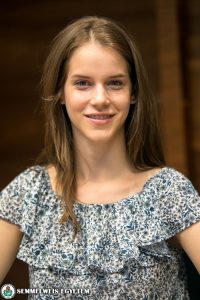 In her third year, Gabriella found herself in a unique situation: she was assigned to carry out all aspects of a research project together with a Norwegian student by the name of Ane Stensønes Dybvig, and so the main communication language was English. “This is a great example of how the program connects Hungarian and international students,” states Dr. Kiss, who is proud of his students’ ability to carry out the many hours of experimentation with the appropriate coordination. “We had to locate and extract mice aorta under a microscope, and then carry out all of the related experimental protocol.” Gabi recounts, which required a great deal of precision and concentration from the two students. “It is always a great feeling to see that our work has meaning, and that our findings can be used in future research,” she says.
In her third year, Gabriella found herself in a unique situation: she was assigned to carry out all aspects of a research project together with a Norwegian student by the name of Ane Stensønes Dybvig, and so the main communication language was English. “This is a great example of how the program connects Hungarian and international students,” states Dr. Kiss, who is proud of his students’ ability to carry out the many hours of experimentation with the appropriate coordination. “We had to locate and extract mice aorta under a microscope, and then carry out all of the related experimental protocol.” Gabi recounts, which required a great deal of precision and concentration from the two students. “It is always a great feeling to see that our work has meaning, and that our findings can be used in future research,” she says.
Gabriella gave birth to her son, Abel, in her fourth year of studies, and she remained active in the program for a year. After the birth of Abel, work processes had to be reorganized. By then, her experiments were largely complete and the data analysis could be done from home; she was also able to finish her rector’s coursework during that time. Gabriella reiterates how grateful she is for the tremendous amount of help and support she received from her mentor with everything she did.
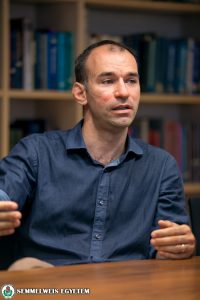 Dr. Kiss, who has been awarded the Prize of Excellence in Science Education Award, has been mentoring members of the Students’ Science Association since 2004, during which time he has helped pave the academic careers of more than 20 students. Dr. Kiss says that he has always been interested in helping students, starting from when he was a third-year demonstrator. As a mentor, Dr. Kiss believes it is important to assess how he can help his students in a way that credits their talent. He thinks the best way to encourage growth and development is to offer advice on how to solve students’ problems, rather than just giving them concrete solutions. Students can also learn how to stay properly informed, look at scientific statements with a more critical eye, learn how to properly write a speech, gain insights into the world of conferences, and gain valuable life experience outside of science. The Students’ Science Association program also offers the opportunity to practice English and, as Gabriella’s example shows, build connections with students from around the globe. Dr. Kiss drew attention to the fact that failure is also a critical part of the research process, which must be experienced by students as well.
Dr. Kiss, who has been awarded the Prize of Excellence in Science Education Award, has been mentoring members of the Students’ Science Association since 2004, during which time he has helped pave the academic careers of more than 20 students. Dr. Kiss says that he has always been interested in helping students, starting from when he was a third-year demonstrator. As a mentor, Dr. Kiss believes it is important to assess how he can help his students in a way that credits their talent. He thinks the best way to encourage growth and development is to offer advice on how to solve students’ problems, rather than just giving them concrete solutions. Students can also learn how to stay properly informed, look at scientific statements with a more critical eye, learn how to properly write a speech, gain insights into the world of conferences, and gain valuable life experience outside of science. The Students’ Science Association program also offers the opportunity to practice English and, as Gabriella’s example shows, build connections with students from around the globe. Dr. Kiss drew attention to the fact that failure is also a critical part of the research process, which must be experienced by students as well.
Gabriella has participated in many successful Students’ and International Students’ Scientific Association conferences, has lectured at the Frigyes Koranyi Scientific Forum, where she was a prize-winner, and also received a third place award for her rectors’ coursework, alongside multiple other scholarships. She spent two years at the Heart and Vascular Centre under the direction of Dr. Pal Maurovich-Horvat, where she studied the relationship between sleep and coronary heart disease. When asked about her plans for the future, Gabriella says she would definitely like to spend a year at home with her son and perhaps pursue her PhD, although she would like to try out more areas before fully committing herself. She adds that Paediatrics and Haematology are also close to her heart.
Bernadett Kiss-Bódi
Photo: Kovács Attila- Semmelweis University
Translation: Faye Gillespie
